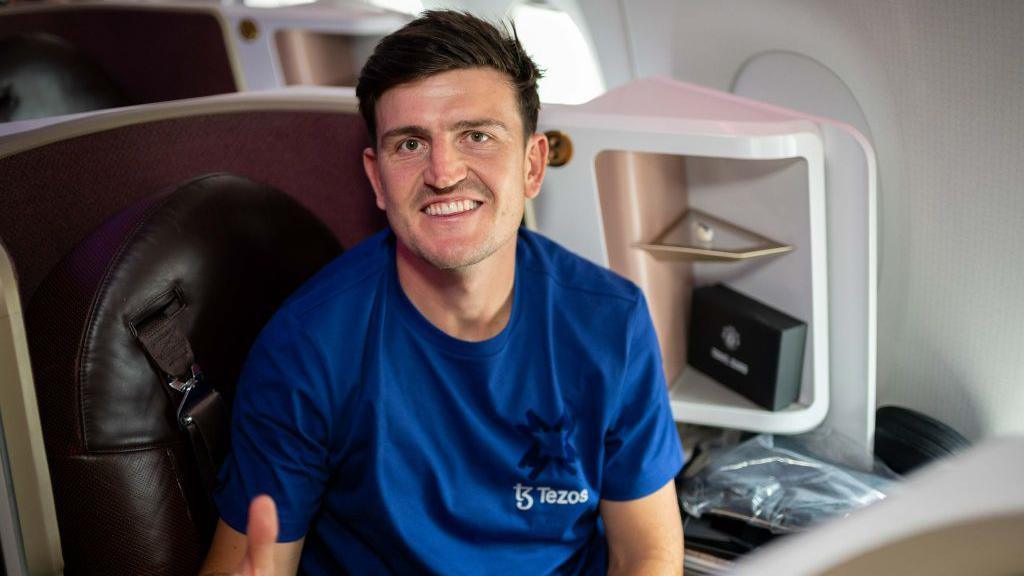Which Premier League clubs fly the most in pre-season?

Newcastle fans in Australia welcome the team in a post-season friendly with Tottenham at Melbourne Cricket Ground - three days after the 2023-24 Premier League season ended
- Published
Los Angeles or Chesterfield? San Diego or Salford?
The pre-season destinations of 20 Premier League clubs may be varied, but the issue remains the same - the impact of so many flights.
Half (10) of the clubs have flown to the United States for friendlies; three have travelled to the Far East and the rest are in Europe and the UK.
Manchester United's pre-season schedule sees them flying almost 13,000 miles to play fixtures in Norway, Scotland, and across the US. Chelsea and Spurs are also expected to fly in excess of 12,000 miles.
In contrast, Everton will fly the least, with just one fixture outside the UK in the Republic of Ireland.
Several clubs are also playing games against neighbouring non-league clubs, which helps provide much-needed income to make the football pyramid more sustainable and boost the local economy. Southampton play Eastleigh, West Ham play Dagenham, Villa play Walsall and Palace play Crawley.
Spurs and Newcastle also played an exhibition fixture in May - three days after the season finished - for which they both flew to Melbourne, Australia, a game Alan Shearer described as “madness”. Add in those air miles and both teams will have travelled in excess of 30,000 air miles in the close-season, equivalent to more than once around the globe, to play in non-competitive matches.
Newcastle and Spurs both have a target to be halve emissions by 2030 and be Net Zero by 2040, while Manchester United and Chelsea are in process of establishing an emissions reduction plan.
Net Zero requires the reduction and removal of all 'non-essential emissions' - so are these games essential?
Leagues to sue Fifa over 'abuse of dominance'
- Published23 July 2024
Premier League pre-season fixtures & results
- Published11 August 2024
Newcastle v Spurs friendly in Australia 'madness'
- Published20 May 2024
All 20 clubs' air miles totals in pre-season
Wycombe's David Wheeler is a leading sustainability campaigner in football and told BBC Sport: "These games are only necessary in the sense that the clubs want to make more money and grow their fanbase".
He added: "The vast majority of players don't want to be away from their families, they don't want to be travelling around the world after a full slog of a season. They're overworked and injuries have gone through the roof, so there is a synergy between player welfare and planetary welfare."
In April, Premier League chief executive Richard Masters said the football calendar is "getting to a tipping point". However, the Premier League also launched its own branded 'Summer Series' of fixtures in the United States last year, which is due to return next year.
As part of the ongoing dispute around the global football calendar, world governing body Fifa accused some leagues of "hypocrisy" and "commercial self-interest" this week by sending their players on "extensive" global pre-season tours.
Table including the Newcastle & Spurs post-season trip
Including the May trip to Australia for Newcastle and Tottenham more than doubles those two clubs' total flights in the close-season and puts them way above the rest of the Premier League for environmental impact.
PL clubs summer flights
| Team | Games | Air Miles | CO2 (Kg) |
|---|---|---|---|
| TOT | 7 | 33,459 | 573,600 |
| NEW | 7 | 32,540 | 566,466 |
| MNU | 6 | 12,864 | 197,773 |
| CHE | 6 | 12,529 | 200,129 |
| BRI | 4 | 11,976 | 208,482 |
| ARS | 5 | 11,424 | 185,198 |
| AST | 7 | 11,398 | 176,128 |
| BOU | 4 | 10,904 | 189,820 |
| WOL | 4 | 10,150 | 167,529 |
| WHU | 5 | 9,971 | 161,939 |
| MNC | 5 | 9,794 | 158,062 |
| CRY | 5 | 8,921 | 150,503 |
| LIV | 4 | 8,300 | 140,984 |
| FOR | 6 | 5,256 | 43,251 |
| FUL | 2 | 3,070 | 25,262 |
| IPS | 4 | 2,675 | 22,011 |
| BRE | 5 | 1,944 | 15,996 |
| SOU | 5 | 1,503 | 12,368 |
| LEI | 4 | 1,319 | 10,853 |
| EVE | 5 | 511 | 4,204 |

Context: How big are the CO2 emissions?
An estimated travelling group of 30 flying 12,864 air miles business class generates around 200 tonnes of CO2 - the equivalent of 500,000 miles driven by an average petrol car, or the entire annual emissions for a year of 16 people in the UK.
Although relatively small emissions in football's bigger picture, as clubs try to help spread a positive message on environment, experts argue that the pollution generated by these close-season fixtures undermines progress.
Dr Mark Doidge from the University of Loughborough said: "The continued thirst of Premier Leagues clubs for a global audience has significant implications for the sustainability of football.
"These pre-season friendlies make it much harder for football to be seen as a leader in the fight against climate change as they are not leading by example. Too often, the focus is on fans and their CO2 emissions, rather than turning the attention on clubs and football authorities.
"Fans are not stupid and can spot hypocrisy a mile off. If the club is not leading by example, then they lose any moral authority to ask fans to join the fight."
What was the response to the figures?

Harry Maguire is part of Manchester United's pre-season tour which took in Norway, Scotland and the United States
The Premier League regularly points out that clubs implement their own travel plans and that, for some clubs, their flights taken in a season make up less than 1% of their total emissions.
Clubs have signed up to a league-wide commitment which includes developing a robust environmental sustainability policy by the end of the 2024-25 season.
Tottenham said they are "committed to minimising its environmental impact" in all their operations, "which will take time and effort". Spurs say they ensure all teams travel "as sustainably as possible throughout the season". The club "measures, manages and reports on travel emissions" and will offset "where possible".
A Premier League spokesperson said: “The Premier League recognises the need to take action on climate change and is committed to reducing its overall climate impact. In November 2021, the League joined forces with other leading sports organisations by signing up to the UN Sports for Climate Action Framework, which includes aims to achieve Net Zero emissions by 2040.
“The Premier League is also progressing its own environmental sustainability strategy development, which will set out plans to deliver climate action. As part of this strategy, the League will continue to engage with and work alongside clubs and partners, to find practical ways of reducing football’s environmental impact. We will also encourage fans throughout the world to consider how they can contribute to this action and reduce their own carbon footprint.
“Clubs have demonstrated their commitment to positive change in this area and continue to play an important role in raising awareness of the issue among fans, while also working on policies to improve environmental sustainability across their business operations."
BBC Sport methodology
BBC Sport calculates the distance between fixtures using the most local airports and assuming teams would fly directly from one fixture to another unless there was a significant gap between games - in which case we factored in a return flight.
We use the Air Miles Calculator., external The emissions calculations are based on a travelling party of 30 flying business class on scheduled services and weighted according to UK government greenhouse gas conversions.
Some teams have flown more air miles, but polluted less because there are different CO2 per mile calculations depending on whether the flight is domestic, short haul to or from the UK, long haul to or from the UK or an international flight between two non-UK destinations.
The results are an indicator of air miles and emissions only.
BBC Sport has sent two journalists to cover selected games in the Unites States this summer, and one journalist to Everton v Sligo Rovers.
Related topics
- Published11 August 2023
